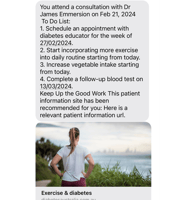In the fast-paced world of healthcare, documentation has long been a necessary yet time-consuming...
Enhancing Patient Care with Generative AI: Beyond Clinical Notes
In the dynamic field of healthcare technology, generative AI is poised to significantly enhance how medical professionals manage and interact with patient information. While AI-driven healthcare scribes currently improve clinical efficiency by automating the transcription of notes, the potential applications of generative AI are much broader.
Improving Health Literacy and Communication
Health literacy remains a significant barrier to effective patient care, as numerous studies have demonstrated. Patients often struggle with medical instructions due to poor health literacy, which can lead to serious health risks post-discharge.
Insights into Patient Communication Challenges
The graph above sheds light on the main challenges patients face in recalling or understanding medical advice. The complexity of medical information and the prevalent use of medical jargon are the most significant obstacles. Other factors, such as the emotional impact of receiving medical news and the patient's condition at the time of receiving instructions, also critically influence their ability to process and remember this information. These insights underscore the importance of developing communication strategies that address these barriers effectively.
Expanding the Use of Generative AI
Envision a generative AI system that extends beyond transcribing conversations; it could analyse dialogues to create personalized summaries and actionable to-do lists in easily understandable language. This would not only bridge the health literacy gap but also empower patients to actively manage their health. Ensuring that patients understand their care instructions could greatly enhance patient safety and decrease hospital readmissions.
Generative AI as a Support Tool for Healthcare Professionals
Healthcare professionals often face overwhelming workloads, which can lead to fatigue and burnout. Generative AI can alleviate this burden by automating the creation of educational materials and communications that are tailored to the patient's level of understanding. This integration requires minimal additional effort from healthcare staff, as it can seamlessly fit into existing workflows.
A Call to Action
Incorporating generative AI into health literacy initiatives could significantly enhance patient-centered care. By tailoring communication to the individual needs of patients, healthcare providers can deliver care that is not only effective but also equitable.
Generative AI holds tremendous potential in healthcare, especially in improving patient comprehension and engagement through customized communication strategies. As this technology continues to evolve, it is expected to play a crucial role in transforming patient outcomes, easing the burden on healthcare providers, and fostering a more informed and proactive patient population.
For further exploration of health literacy impacts and the integration of AI in healthcare, the full article from JAMA Network Open provides detailed insights and can be accessed here: JAMA Network Open.
This approach emphasizes the integration of visual data and empirical evidence to enhance the discussion on the need for advanced communication methods in healthcare, backed by the referenced study by Alison R. Carroll et al.【1】and literature on health literacy impacts on patient care【2】.
【1】Carroll, A.R., et al. (2024). Health Literacy–Informed Communication to Reduce Discharge Medication Errors in Hospitalized Children: A Randomized Clinical Trial. JAMA Network Open, 7(1):e2350969.
【2】Rothman, R.L., et al. (2009). Health literacy and quality: focus on chronic illness care and patient safety. Pediatrics, 124(Supplement 3), S315-S326.
-1.jpg?width=150&height=150&name=Social_Profile_Mirko%20(2)-1.jpg)


